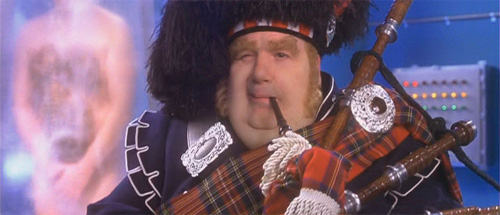Fat Bastards Beyond the Border
Thursday, September 28, 2006
posted by Steve Tompkins
 Print This Post
Print This Post

Roughhousing with Slasher in “Beyond the Black River” the other day, I came across this on page 51 of The Conquering Sword of Conan (the Cimmerian is balking at the prospect of the forest demon absconding with Tiberias’ head): “I never liked the fat bastard, but we can’t have Pictish devils making so cursed free with white men’s heads.”
Once the gigantic mirth subsided I started checking the story’s previous appearances. Conan the Warrior has “I never liked the fat fool.” Hans Stefan Santesson’s 1970 anthology The Mighty Swordsmen has “I never liked the fat fool.” Red Nails, the 1977 Berkley volume edited by Karl Edward Wagner, has “I never liked the fat fool.” So does Robert Adams’ 1985 anthology Barbarians. So obviously “fat fool” is from the Weird Tales text, whereas “fat bastard” must have been reinstated by Patrice Louinet from Howard’s final draft. It would be interesting to know what Farnsworth Wright’s SOP was for minor or single-word emendations like this. He couldn’t fax or e-mail Howard, and even telephoning might have busted the WT budget, so presumably he went full speed ahead and changed the wording himself.
“Fat fool” is at least alliterative, and it’s possible to argue that “fat bastard” has gained too much pop culture girth since Howard wrote “Beyond the Black River.” Some readers might think of Mike Myers’ supersized Scotsman in The Spy Who Shagged Me, and the term is the insult of choice when directed to the non-svelte in sundry Mafia-or-mean streets dramas (As an experiment, say the words to yourself in Joe Pesci’s voice: “Ya fat bastid!“). But such distractions aren’t Howard’s fault, and it’s a delight to find “fat bastard” and several other instances of more colorful language scattered throughout the Wandering Star/Del Rey texts. In decades past Conan too often sounded like Arnold Schwarzenegger or de Camp & Carter or Robert Jordan or even, at a higher level of aspiration and inspiration, Roy Thomas, so restorations that make Conan sound more like Robert E. Howard (and especially the “damnedest bastard that ever was” Howard of One Who Walked Alone) are mighty fine.
The Wandering Star editors don’t get nearly enough credit for making available not only pure texts but also Ur-texts, for stripping away the effects of, well, time and mischance. It sometimes seems to me that the collectors have been outshouting the readers in letters to the Lion’s Den, REHupa mailing comments, and innercircle posts. The collectors can’t forgive Wandering Star for having gone with a business model (if that’s the appropriate jargon) that left the Library of Classics, like Wile E. Coyote when one of his Acme-ordered products runs out or gives way, suspended halfway across a chasm. The WS guys are at fault for having hand-picked one or another illustrator, or for having commissioned illustrations at all, they did this wrong, and that wrong, and that other thing over there–in short, they can’t win for losing. All debate-worthy, certainly, but where are the readers, all those who should be grateful for the chance to read more and “better” Howard? I may be an extreme case (it’s been said before), but for me a “fat bastard” here and there, together with the opportunity to watch Howard working out the timelines and distances of The Hour of the Dragon on paper, or see Conan gripped by what Churchill used to call the “black dog” of depression in that early draft of “The Phoenix on the Sword,” outweigh whatever miscalculations have occurred. With only some typescripts rather than a sarcophagus and its resident mummy at their disposal, the WS-ers have come close to duplicating the feat of Orastes, Valerius, Tarascus, and Amalric–they’ve brought Howard back from “death’s gray lands” more thoroughly than has ever been done before.
So thanks, gents, and here’s hoping you have more “fat bastardly” surprises in store for us.
LEO ADDS: I of course agree, and made certain to expose my readers to this exact same argument well over two years ago (before The Lion’s Den even existed), in the very first issue of The Cimmerian in 2004. “Hell Needs a New Devil” was a heartfelt summation of what I argued was the single most important result of the Wandering Star books: while the disappointment of collectors is transient, due to be forgotten as new Conan sets appear on the horizon, the readers of Howard have ample cause to rejoice, for much of Howard’s best work has been granted a permanence that will have generations of enthusiasts singing the praises of Wandering Star.
At the time, the Wandering Star/Dark Man guys dismissed my piece as a lame pretense at editorial fairness, a Lilliputian offset of the the lengthy criticisms made against WS earlier in the symposium. And yet two years later I still know of no other Howard publication where this point has been made more forcefully, eloquently, or prominently. Certainly not The Dark Man, which for eight years has eschewed deep analysis of Wandering Star’s achievement along with virtually everything else that has occurred in Howard studies.
